

Travel Guide
- Things to Do
- Health & Insurance
- Visitor Information
- Entry Requirements & Customs
- Getting Around
- Regions in Brief
- Calendar of Events
- Getting There
- Tips on Accommodations
- Sustainable Travel & Ecotourism
- Escorted & Package Tours
- Tips for Families
- Tips for Gay and Lesbian Travelers
- Tips for Senior Travelers
- Tips for Travelers with Disabilities
- Staying Connected
- Active Pursuits
- Suggested Itineraries
Entry Requirements and Customs in Scotland
Entry Requirements
All U.S. citizens, Canadians, Australians, New Zealanders, and South Africans must have a passport with at least 2 months' validity remaining. No visa is required. The immigration officer will also want proof of your intention to return to your point of origin (usually a round-trip ticket) and visible means of support while you're in Scotland. If you're planning to fly from the United States or Canada to the United Kingdom and then on to a country that requires a visa (India, for example), you should secure that visa before you arrive in Britain.
Your valid driver's license and at least 1 year of driving experience are required to drive personal or rented cars.
For an up-to-date country-by-country listing of passport requirements around the world, go the "Foreign Entry Requirement" Web page of the U.S. Department of State at http://travel.state.gov .
For Residents of Australia — Contact the Australian Passport Information Service at tel. 131-232, or visit the government website at www.passports.gov.au .
For Residents of Canada — Contact the central Passport Office, Department of Foreign Affairs and International Trade, Ottawa, ON K1A 0G3 (tel. 800/567-6868; www.ppt.gc.ca ).
For Residents of Ireland — Contact the Passport Office, Setanta Centre, Molesworth Street, Dublin 2 (tel. 01/671-1633; www.dfa.ie/passports ).
For Residents of New Zealand — Contact the Passports Office at tel. 0800/225-050 in New Zealand or 04/474-8100, or log on to www.passports.govt.nz .
For Residents of the United States — To find your regional passport office, either check the U.S. Department of State website or call the National Passport Information Center toll-free number (tel. 877/487-2778 ) for automated information.
What You Can Bring Into Scotland — Non-E.U. Nationals can bring in, duty-free, 200 cigarettes, 100 cigarillos, 50 cigars, or 250 grams of smoking tobacco. This amount is doubled if you live outside Europe. You can also bring in 2 liters of wine and either 1 liter of alcohol over 22 proof or 2 liters of wine under 22 proof. In addition, you can bring in 60 mLs (2 oz.) of perfume, a quarter liter (250ml) of eau de toilette, 500 grams (1 lb.) of coffee, and 200 grams (1/2 lb.) of tea. Visitors 15 and over may also bring in other goods totaling £145; the allowance for those 14 and under is £73. (Customs officials tend to be lenient about general merchandise, realizing the limits are unrealistically low.)
What You Can Take Home from Scotland — For information on what you're allowed to bring home, contact one of the following agencies:
U.S. Citizens: U.S. Customs & Border Protection (CBP), 1300 Pennsylvania Ave., NW, Washington, DC 20229 (tel. 877/287-8667; www.cbp.gov ).
Canadian Citizens: Canada Border Services Agency (tel. 800/461-9999 in Canada, or 204/983-3500; www.cbsa-asfc.gc.ca ).
U.K. Citizens: HM Customs & Excise at tel. 0845/010-9000 (from outside the U.K., 020/8929-0152), or consult their website at www.hmce.gov.uk .
Australian Citizens: Australian Customs Service at tel. 1300/363-263, or log on to www.customs.gov.au .
New Zealand Citizens: New Zealand Customs, The Customhouse, 17-21 Whitmore St., Box 2218, Wellington (tel. 04/473-6099 or 0800/428-786; www.customs.govt.nz ).
Note : This information was accurate when it was published, but can change without notice. Please be sure to confirm all rates and details directly with the companies in question before planning your trip.

- All Regions
- Australia & South Pacific
- Caribbean & Atlantic
- Central & South America
- Middle East & Africa
- North America
- Washington, D.C.
- San Francisco
- New York City
- Los Angeles
- Arts & Culture
- Beach & Water Sports
- Local Experiences
- Food & Drink
- Outdoor & Adventure
- National Parks
- Winter Sports
- Travelers with Disabilities
- Family & Kids
- All Slideshows
- Hotel Deals
- Car Rentals
- Flight Alerts
- Credit Cards & Loyalty Points
- Cruise News
- Entry Requirements & Customs
- Car, Bus, Rail News
- Money & Fees
- Health, Insurance, Security
- Packing & Luggage
- -Arthur Frommer Online
- -Passportable
- Road Trip Guides
- Alaska Made Easy
- Great Vacation Ideas in the U.S.A.
- Best of the Caribbean
- Best of Mexico
- Cruise Inspiration
- Best Places to Go 2024
- Jump to main content
Travel Essentials
When planning a trip to Scotland it’s easy to get so excited about all the amazing things you’re going to do that one or two essentials slip your mind. Don’t worry though, we have you covered! From accommodation and currency to driving and connectivity, this is your one-stop shop for essential travel information.
Accommodation
Whether you’re looking for five-star luxury, a quaint B&B or a unique ‘glamping’ experience, Scotland has an impressive array of accommodation options. After a busy day uncovering the myths and legends of our ancient buildings, sampling the whisky at a local distillery or dancing the night away at one of our ceilidhs, you’ll definitely need somewhere to rest your head and recharge your batteries for your next adventure.
Learn more here
If you’ve got an international driving license then you’re able to drive in Scotland. This is especially good news when you realise the amount of jaw-dropping, scenic road trips you can soak up during your visit. We also have a large number of car rental firms spread throughout the country, making it easier for you to find a vehicle during your trip. Wherever you plan to drive in Scotland, we recommend allowing some extra time for your journey, because you’re definitely going to stop along the way for some photos!
Learn more about driving at VisitScotland.com
We take your safety incredibly seriously; after all, Scotland is famous throughout the world for its warm welcome and hospitality. More than 2.5 million visitors travel to Scotland every year and everyone speaks of the genuine friendliness of the Scottish people. We work incredibly hard to create safe place for you and your family to visit and our dedicated police force work within our communities to tackle and prevent crime.
Travel Visas
When planning a trip, it’s important to know what legal documents you may require to enter the country. It’s important to note that, depending on where you are travelling from, you may need a visa to enter Scotland. If you’re an EU citizen, then you don’t need a visa to visit Scotland, however, if you’re travelling from outside of the European Union, you may need one. This will depend on how long you’re planning to stay and why you’re visiting.
Learn more about travel visas on Visitscotland.com
Currency and Cost
During your trip to Scotland, one of the biggest decisions you’re going to have to make is what souvenirs to take back to remind you of your visit. To make sure you’re not caught short at the register, it’s important to know all about the currency and the different methods of payment we accept. Foreign currency is rarely accepted in Scotland, but we also have plenty Bureau de Change kiosks at our international airports and in most of our city centres, making sure you have the right money for your purchases.
Where is Scotland
Located in the mid-west of Europe, Scotland may be small but we’re punching well above our weight! Occupying the northern third of Great Britain we share a border with England in the south and pack some of the most stunning scenery in all of the UK into our borders. From wild coastlines and pristine beaches to rolling valleys and towering mountains, Scotland’s geography is a huge part of its appeal.
- Skip to main content
Information
You appear to be using an unsupported browser, and it may not be able to display this site properly. You may wish to upgrade your browser .
We use cookies to collect anonymous data to help us improve your site browsing experience.
Click 'Accept all cookies' to agree to all cookies that collect anonymous data. To only allow the cookies that make the site work, click 'Use essential cookies only.' Visit 'Set cookie preferences' to control specific cookies.
Your cookie preferences have been saved. You can change your cookie settings at any time.
Help with passports
Apply for, renew or update a uk passport online.
Visit GOV.UK to find out about about online passport applications, renewals and updates.
Get a passport urgently
Find out how to get a passport in a week or less .
Find a Passport Customer Service Centre
Use the Find a Passport Customer Service Centre tool on GOV.UK to find your nearest Passport Office.
Passport advice, complaints and helpline
Visit GOV.UK to find out how to contact His Majesty's Passport Office (HMPO).
Passport photo requirements
Visit GOV.UK to make sure photos for your passport, driving licence or visa meets all the rules required.
Get a passport for your child
Visit GOV.UK for help with child passports.
Apply for your first adult passport
If you are applying for your first adult passport and have questions, visit GOV.UK to find out more.
Passport Check and Send service
Use the Check and Send service at selected Post Office branches to reduce the chances of your passport application being rejected.
Free passports for British nationals born before 2 September 1929
You can get or renew a British passport for free if you're a British national and were born on or before 2 September 1929.
Find out how to apply.
Countersigning passport applications and photos
Check GOV.UK for information on countersigning passports.
Get an emergency travel document
An emergency travel document lets you leave another country if you can't get a new or replacement British passport in time to travel.
How to get an emergency travel document.
Passport fees
Visit GOV.UK to find out how much it costs get a passport.
Track your passport application status
Visit GOV.UK to track your passport application status.
Renew or replace your adult passport
Visit GOV.UK to find out how to renew or replace your adult passport.
Apply for, renew or replace a British passport from overseas
Find out how to apply for, renew or replace a British passport if you're outside the UK.
There is a problem
Thanks for your feedback
Your feedback helps us to improve this website. Do not give any personal information because we cannot reply to you directly.
Covid: Scotland's international travel testing regime to be relaxed
- Published 24 September 2021
- Coronavirus
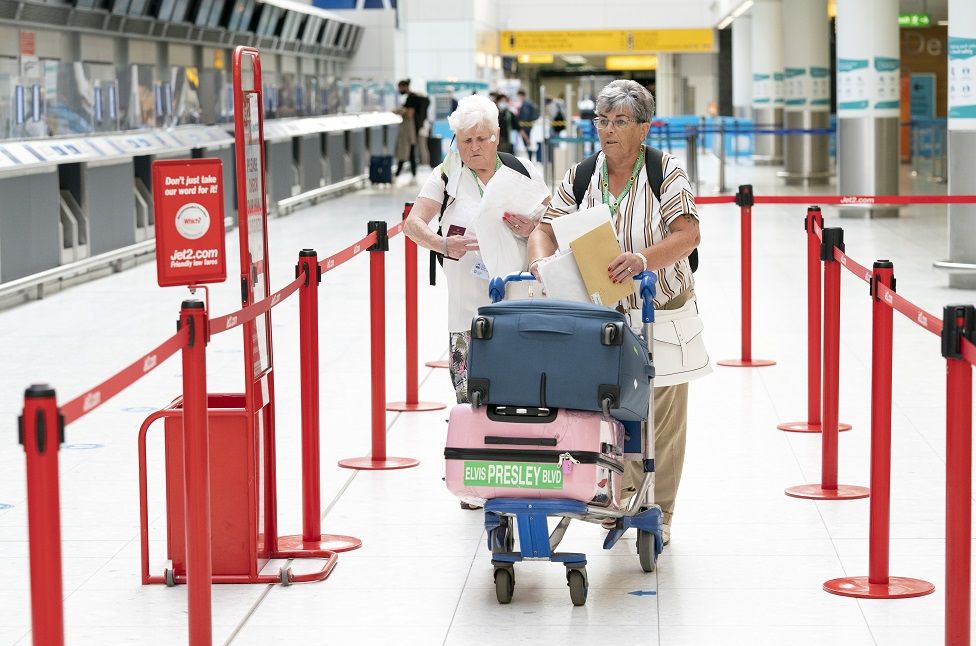
Fully-vaccinated people travelling to Scotland from overseas will no longer have to take pre-departure Covid tests, the Scottish government has confirmed.
The change will benefit Scots returning home from abroad and visitors from non-red list countries.
Scotland will also "align with the UK post-arrival testing regime" but details have still to be finalised.
Last week the Scottish government said testing requirements would remain due to public health concerns
Transport Secretary Michael Matheson said ministers still had concerns, but after talks with the aviation industry they had "reluctantly concluded" that following the UK's path on testing was the "best option".
- The eight countries now off the red list
- Testing rules 'could destroy' tourism season
Plans to simplify the international travel traffic light system by merging green and amber classifications and removing more countries from the red list were announced last Friday.
Those changes will come into effect on 4 October.
Now it has also been confirmed that travellers from non-red list countries who have been fully vaccinated will not be required to provide evidence of a negative test result before travelling to Scotland.
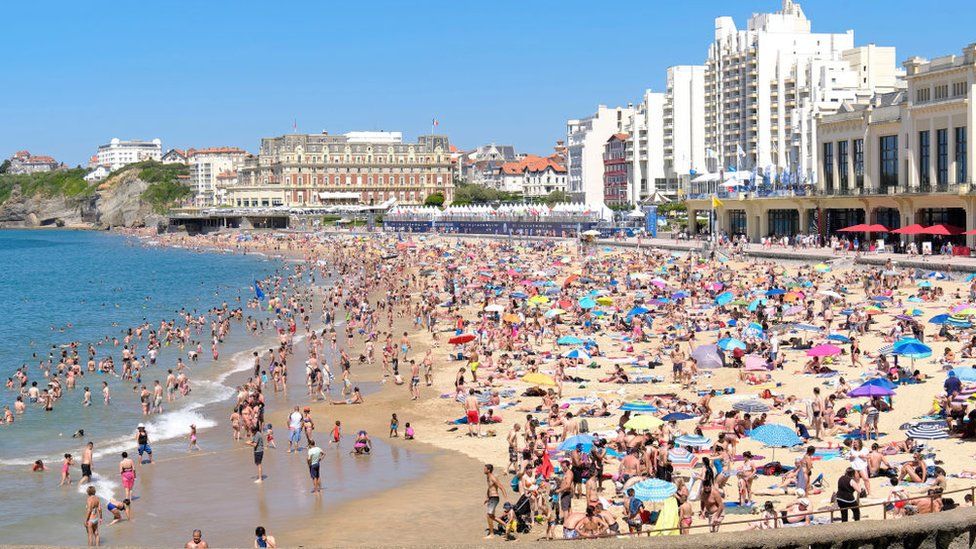
However, they must have been vaccinated in a country that meets "recognised standards of certifications".
Mr Matheson said the move to align with the rest of the UK came after consideration of the "logistical, health and economic implications".
He added: "We have urgently considered all these implications, weighing any possible impact on the public health and the logistical realities.
"After liaising at length with stakeholders from the aviation sector to understand the impact of adopting a different approach in Scotland, we have reluctantly concluded that, for practical reasons, alignment with the UK is the best option."
Gordon Dewar, chief executive of Edinburgh Airport, said: "We welcome this decision which will be a huge bonus for Scotland's travel and tourism sector and will provide some much needed confidence for people who need and want to travel."
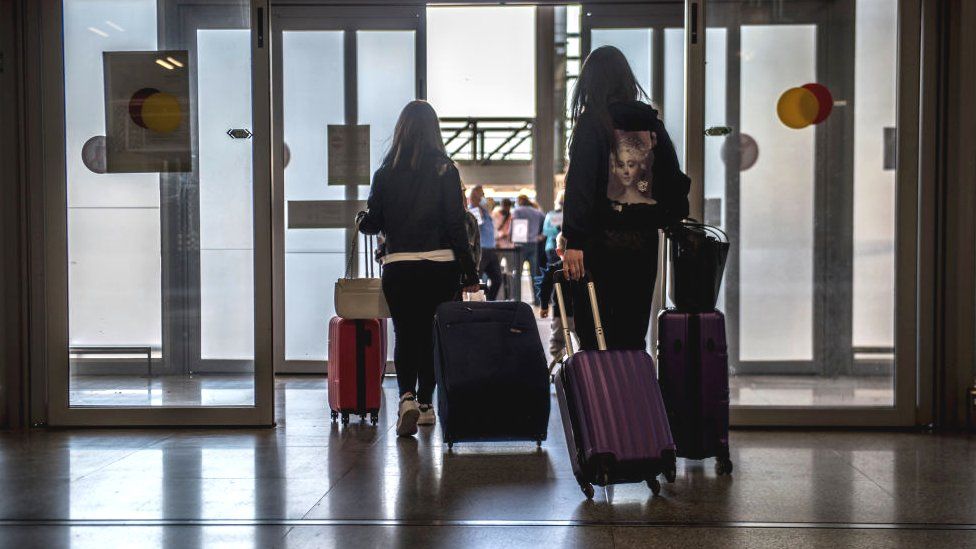
Derek Provan, chief executive of AGS Airports, which owns Aberdeen and Glasgow airports, said: "While this is something we have been urging the Scottish government to do for months, and the subsequent delay has negatively impacted the industry in Scotland, it is a welcome step forward.
"By ensuring Scotland has parity with the rest of the UK, this decision is one that will deliver much-needed consumer confidence for our passengers to start travelling again."
Dr Liz Cameron, chief executive of the Scottish Chambers of Commerce, added: "Divergence in international travel restrictions and testing regimes would have placed Scotland and its airports at a significant economic disadvantage.
"This sends a clear signal to the world that Scotland is open for business."
Steve Heapy, chief executive of Jet2.com, claimed the firm had seen an immediate surge in bookings for flights and package holidays since the announcement.
He said: "We had already seen demand step up following the decision to scrap the traffic light system, however this announcement removes a number of major barriers.
"The fact that Scottish holidaymakers will no longer have to take a pre-departure test in resort is a welcome step towards normality."
'Late U-turn'
The Scottish government has also said it would consider how "additional safeguards and surveillance of inward travel can be implemented" in a bid to guard against the importation of new variants of Covid.
Tory transport spokesman Graham Simpson MSP said: "This SNP climbdown will come as a relief to businesses in Scotland's much overlooked tourism and aviation industries.
"However, such a late U-turn means Scottish airports have missed out on any potential recovery that could have been made during the October break."
Jillian Evans, head of health intelligence at NHS Grampian, told BBC Radio Scotland's Drivetime programme said she was a "little perplexed" at the latest easing of travel restrictions when "we are still right in the middle of this pandemic".
"I know some of the trends are going in the right direction and it feels as though we are turning a corner," she added. "Whether that is a sustained position will depend on us continuing to be vigilant and having protective measures in place.
"This announcement today is another one being introduced which could have repercussions. I understand why; it is about being practical and signing up to the situation across the UK. But it doesn't come without risk.
"Even though we will still have PCR testing for red-list countries, there is no guarantee you won't detect variants of concerns in any other country. They are not just restricted to countries on the red list, so I think it's a worry."

- RULES: What are the restrictions in your area?
- EASING: What are the current rules?
- CASES: Where are the latest cases in Scotland?
- WHO? The people who have died with Covid-19

Related Topics
- Coronavirus testing
Covid testing rules 'could destroy' tourism season
- Published 20 September 2021
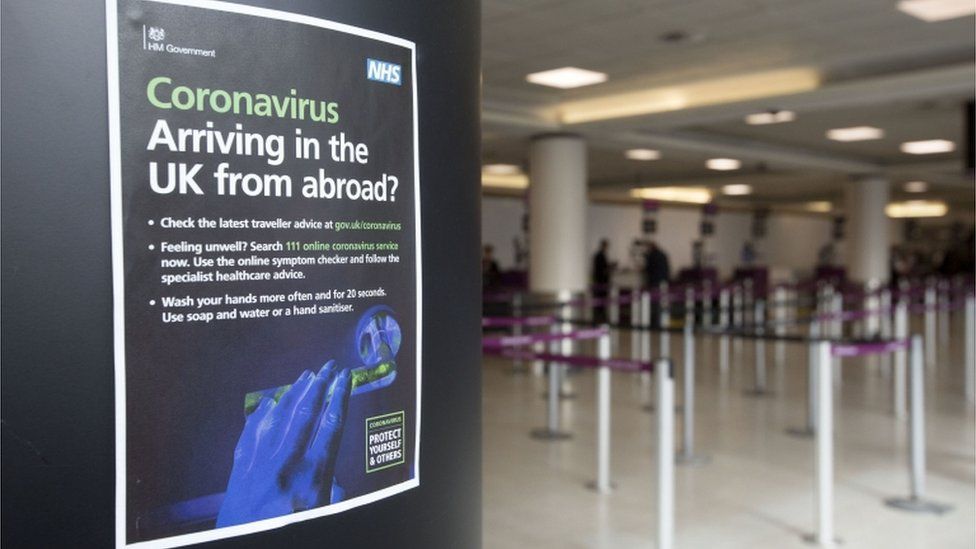
Travel rules simplified but test regime to stay
- Published 18 September 2021
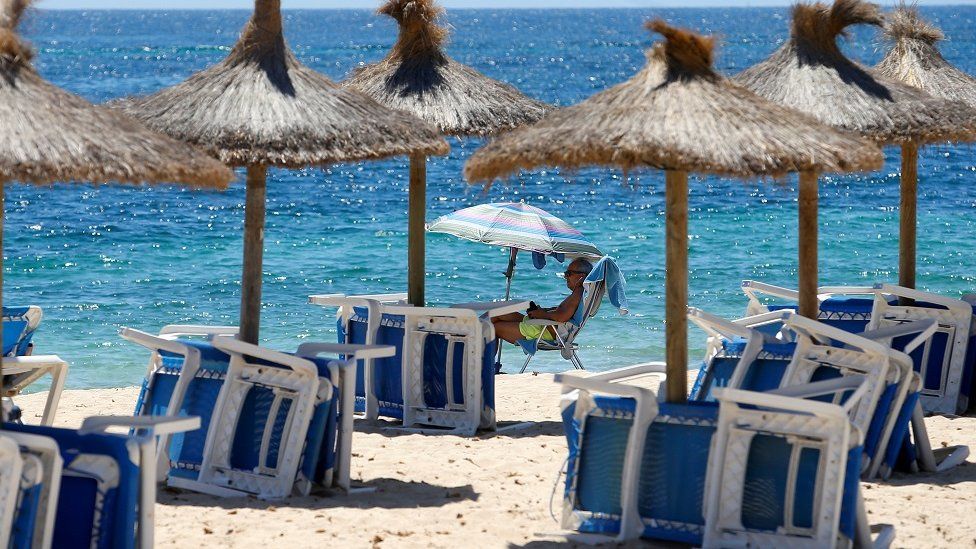
How are travel rules being relaxed?
- Published 11 February 2022

International travel restrictions end
International travel restrictions for people coming to scotland to end.
Following agreement at a cross-UK meeting, all international travel restrictions for people travelling to Scotland are to end on Friday 18 March.
Fully vaccinated travellers will no longer be required to complete Passenger Locator Forms under the change which comes into effect at 4am on Friday 18 March.
Non-vaccinated travellers will no longer be required to take pre-departure and day two PCR tests, and will no longer have to complete Passenger Locator Forms.
Monitoring by the UK Health Security Agency will continue with a contingency toolkit of measures developed tailored to specific future scenarios.
The measures were agreed by the Scottish Government following engagement with all four nations.
The Scottish Government expressed concern over the lack of border control measures and – with the other devolved administrations - called on the UK Government to maintain some form of border surveillance.
However, given the negative impact of non-alignment for the tourism industry, alignment was reluctantly agreed on a four nation basis.
These changes only apply to incoming travellers. People should continue to check gov.uk for the latest information on the requirements in other countries when travelling abroad.
These measures significantly open up international travel and were agreed on a UK wide basis despite the Scottish Government raising concerns over the lack of border controls. However, we recognise the benefits of acting on a four nation basis and this will bring a high degree of normality back to travel and is extremely welcome for Scottish tourism, the aviation sector and travellers alike. There will be continued surveillance by the UK Health Security Agency to monitor for developments of concern and a contingency toolkit is being progressed which will enable an agile and rapid response in future to any changes. This could include tailored restrictions where appropriate and people may wish to continue to observe sensible measures while travelling such as frequent hand washing and respecting social distancing. Michael Matheson, Cabinet Secretary for Net Zero, Energy and Transport
Take a look at the UK Government International Travel Guidance for travel requirements for other countries.
Today’s announcement (15 March)
Legal requirements to wear face coverings on public transport and most indoor public settings will continue until at least early April given the current spike in COVID-19 case numbers, First Minister Nicola Sturgeon announced today (15 March). Find out more.
Related links
Scotland's census 2022 is coming, funding update for the events sector.
NHS Scotland COVID Status
The NHS Scotland COVID Status app has now closed. You can still download a PDF copy online.
How to get a PDF copy
Source: Scottish Government - Opens in new browser window
Last updated: 29 March 2023

Rest and Be Thankful

Visiting Scotland after Brexit - Current guidance for EU visitors
There may be some changes to the way you travel to Scotland now the UK has left the EU, but a holiday here will be just as magical as ever.
We’re here to answer all your questions and make sure your trip here is as easy as it always was.
Visiting Scotland after Brexit

A couple enjoying an afternoon aboard the Borders steam train
© VisitScotland / David N Anderson
Scotland has breath-taking landscapes, unique experiences and charming destinations, and our people are as friendly as always, ready to welcome you and show you around our fascinating country.
We've got all the practical information you need to plan a trip to Scotland, plus a few ideas that deserve to be on any itinerary, whether it's your first trip or your 10th!
Answering your questions
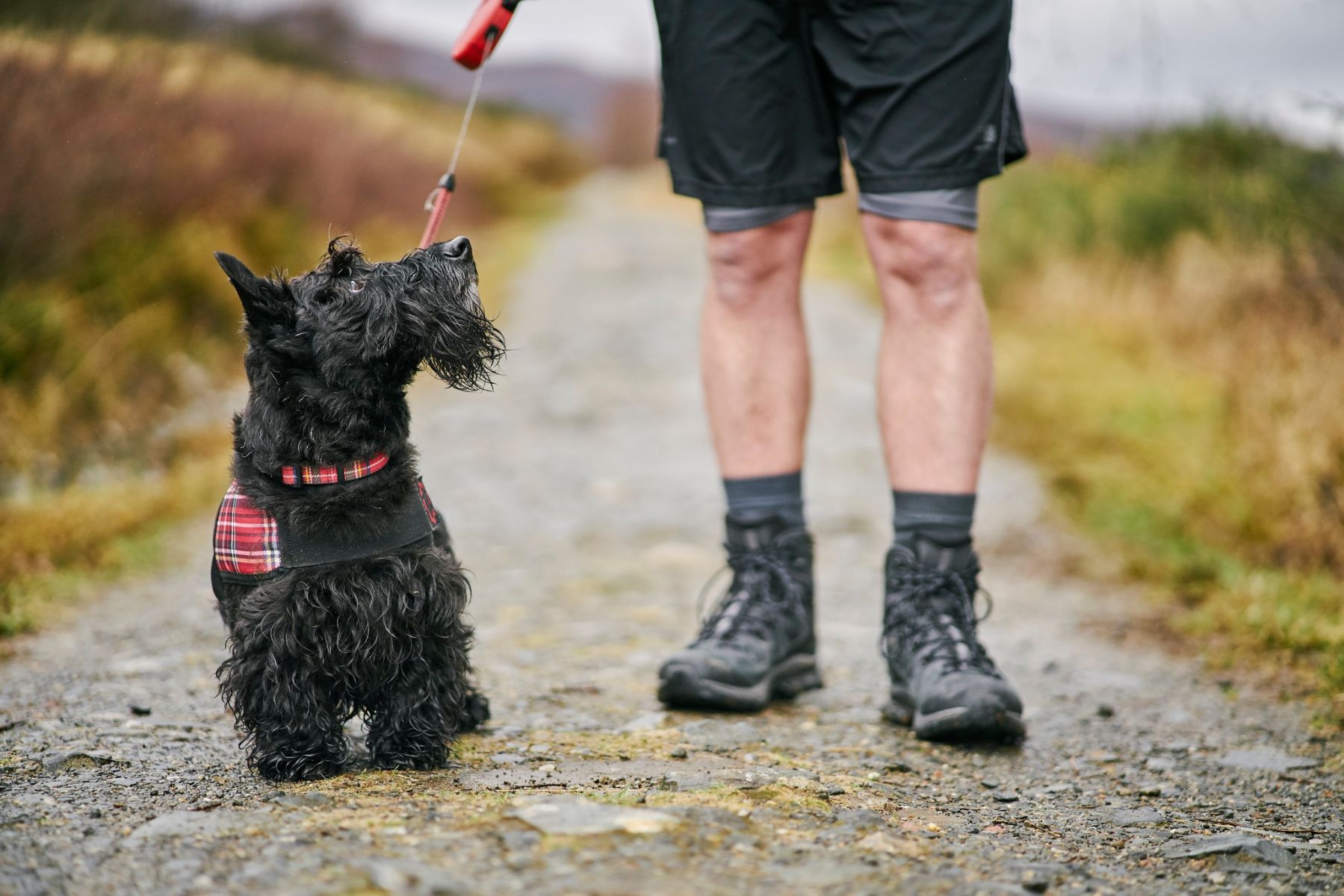
A Scottish terrier being walked along a countryside path
DO I NEED A VISA TO VISIT SCOTLAND AFTER BREXIT?
- EU, EEA and Swiss citizens can stay in the UK as a visitor for up to 6 months without a visa.
- Irish citizens have no visa requirements and can travel to the UK as they did before Brexit.
- Other foreign nationals might need to apply for a Standard Visitor visa.
- You can check here if you need a UK visa .
WHAT WILL I NEED TO SHOW TO ENTER SCOTLAND AFTER THE UK LEAVES THE EU?
- You will need a valid passport to enter the UK. Passports should not expire during your stay in the UK. At the border, officials might ask for proof that you are visiting the UK for tourism, such as a hotel reservation.
- Irish citizens may continue to use their national ID card, which should not expire while in the UK.
WHAT ABOUT SCHOOL GROUPS VISITING SCOTLAND?
- There will be no changes for EU, EEA or Swiss school travellers
- Other foreign nationals will not be able to use the List of Travellers scheme anymore to visit the UK.
Please read the UK Government's advice for school groups for more information.
CAN I BRING A PET TO SCOTLAND WITH ME?
Pet owners will be able to travel with their pet between the EU and the UK with an EU pet passport issued in an EU member state.
WHAT CHANGES ARE THERE TO WHAT I CAN BRING TO SCOTLAND?
Some rules have changed when you bring goods for your own use from the EU to the UK. Find out more about bringing goods into the UK .
WILL MY EUROPEAN HEALTH INSURANCE CARD STILL BE RECOGNISED?
Yes, to access healthcare in Scotland you will need a valid passport or national ID card and a document that proves you have health insurance, such as the EHIC.
You can find out more information on EHIC cards on Schengen Visa Info .
Note: The EHIC is not an alternative to travel insurance and you should have both when travelling to the UK.

Port of Menteith
© Digital Tourism Scotland / Matt Davis
TRAVEL TO SCOTLAND
Will travel to scotland change at all.
Flights, trains, ferries and coaches will continue to operate between the EU and the UK, and vice-versa. Passengers across the continent can continue to book and travel with confidence as they travel on their holidays to the UK.
Make sure you have the correct travel insurance and check the terms and conditions before heading off.
WHILE YOU'RE HERE
Can i bring my car and drive in scotland.
The rules on driving in Scotland remain the same. Your non-UK driving licence is still valid.
Will I be able to use my mobile phone in Scotland?
Tariffs for making phone calls, texting or using mobile data may have changed. Please check with your non-UK provider.
For the latest information, please see the UK Government advice for visiting the UK after Brexit.
Brexit - What You Need To Know
Sorry, something's gone wrong. We can't display this content at the moment.
JavaScript needs to be enabled to watch this video. You can turn this on in your browser settings.
Find out the latest advice on visiting Scotland after the UK leaves the EU, including visas, mobile phone charges, bringing pets and driving.
Find experiences
JavaScript needs to be enabled to see this product search form. You can turn this on in your browser settings.
Other things you might like
Mary Queen of Scots

Outlander Filming Locations in Scotland
Where to See Highland Cows in Scotland

Scottish Munros - Hill & Munro Bagging

Highland Games in Scotland
Harry Potter Film and Book Locations Itinerary

Castles to Visit in Scotland
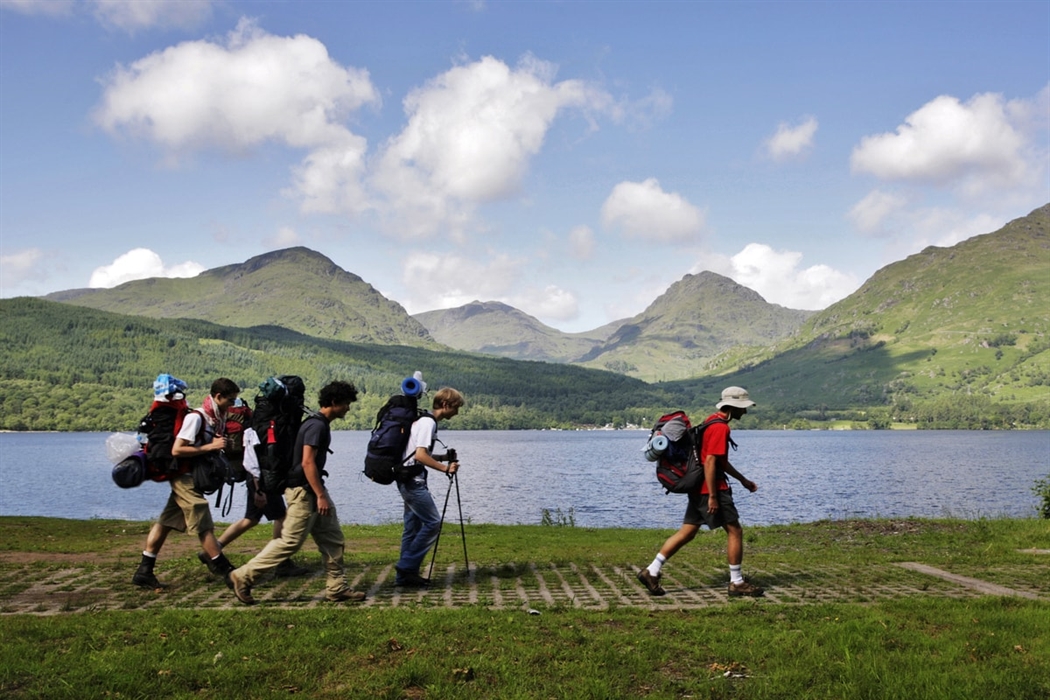
West Highland Way
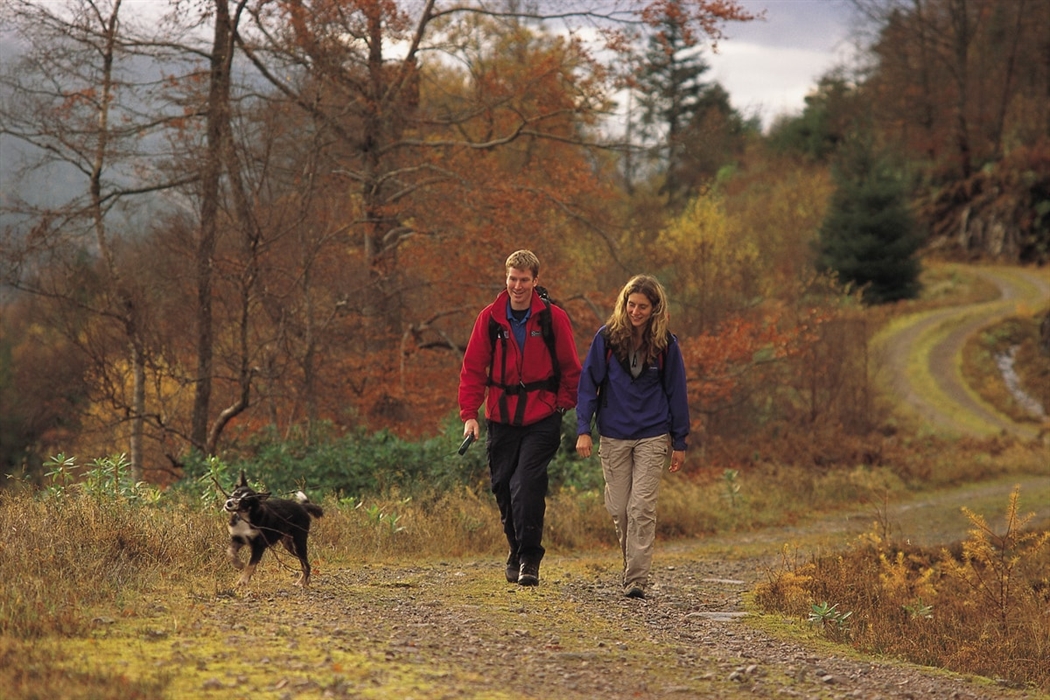
The Great Glen Way
Cookies on GOV.UK
We use some essential cookies to make this website work.
We’d like to set additional cookies to understand how you use GOV.UK, remember your settings and improve government services.
We also use cookies set by other sites to help us deliver content from their services.
You have accepted additional cookies. You can change your cookie settings at any time.
You have rejected additional cookies. You can change your cookie settings at any time.
- Visas and immigration
- Seek protection or asylum
Apply for a Home Office travel document
You can apply for a document to travel outside the UK if:
- you are not British
- you cannot use or get a passport from your country’s national authorities
- your country’s national authorities cannot give you a new passport
Do not book travel until you get your travel document.
Eligibility
To apply you must be living in the UK because of one of the following:
- you have permission to stay as a refugee
- you have humanitarian protection and it has been officially accepted that you have a fear of your country’s national authorities
- you are not recognised as a citizen of any country (a ‘stateless person’) and you have permission to stay (known as ‘leave to remain’) or are settled in the UK (known as ‘indefinite leave to remain’)
- you have permission to stay (known as ‘leave to remain’) or are settled in the UK (known as ‘indefinite leave to remain’), but you cannot get a passport or travel document from your country’s national authorities
You must be in the UK when you apply.
Related content
Is this page useful.
- Yes this page is useful
- No this page is not useful
Help us improve GOV.UK
Don’t include personal or financial information like your National Insurance number or credit card details.
To help us improve GOV.UK, we’d like to know more about your visit today. We’ll send you a link to a feedback form. It will take only 2 minutes to fill in. Don’t worry we won’t send you spam or share your email address with anyone.
- Skip to main content
- Accessibility help
Information
We use cookies to collect anonymous data to help us improve your site browsing experience.
Click 'Accept all cookies' to agree to all cookies that collect anonymous data. To only allow the cookies that make the site work, click 'Use essential cookies only.' Visit 'Set cookie preferences' to control specific cookies.
Your cookie preferences have been saved. You can change your cookie settings at any time.
Significant easing of restrictions for fully vaccinated travellers from the EU and US
Step only possible due to success of vaccination programmes.
Fully vaccinated people from the EU and US will be able to travel to Scotland without quarantining from Monday (2 August).
The need for travellers to self-isolate for 10 days upon arrival in Scotland is being waived subject to countries covered remaining on the amber travel list.
The easing also removes the need for a PCR test on day eight after arrival and is a major relaxation of travel restrictions that were imposed to protect wider public health in Scotland.
All travellers will still be required to produce a negative test prior to departure and a negative PCR test on day two after arrival.
The step has been made possible by the success of vaccination schemes here and abroad with inbound travellers from the EU and US required to produce accepted documentation to prove they are fully protected with recognised vaccines.
Cabinet Secretary for Net Zero, Energy and Transport Michael Matheson said:
“This has only been made possible due to the overwhelming success of our vaccination programme here in Scotland when coupled with successful roll-outs of vaccination schemes in the EU and US.
“Fully vaccinated travellers will be able to travel to Scotland under this significant relaxation of international travel measures, providing a boost for the tourism sector and wider economy while ensuring public health is protected.
“This new arrangement will be carefully monitored by clinicians and kept under close review as we seek to put Scotland firmly on the path to recovery – but people should continue to think very carefully about travelling – especially given the prevalence and unpredictable nature of variants of concern.”
Concerns about the prevalence of the Beta COVID19 variant mean arrivals who have been in France in the previous 10 days are not eligible. The terms of the scheme extend to EU and European Free Trade Association member states, as well as Switzerland, and the US, provided countries remain on the amber travel list. It also covers the European microstates – Andorra, Monaco, San Marino and Vatican City.
The accepted documentation referenced is the EU Digital Covid Certificate and the US Centers for Disease Control and Prevention’s white card – known as a CDC card.
Media enquiries
There is a problem
Thanks for your feedback
Your feedback helps us to improve this website. Do not give any personal information because we cannot reply to you directly.

IMAGES
COMMENTS
All EU, EEA and Swiss nationals (except Irish citizens) will need a valid passport to enter the UK. Your travel document should not expire during your stay in the UK. At the border, officials might ask for proof that you are visiting the UK for tourism, such as a hotel reservation. Irish citizens may continue to use their national ID card.
Customs. What You Can Bring Into Scotland — Non-E.U. Nationals can bring in, duty-free, 200 cigarettes, 100 cigarillos, 50 cigars, or 250 grams of smoking tobacco. This amount is doubled if you live outside Europe. You can also bring in 2 liters of wine and either 1 liter of alcohol over 22 proof or 2 liters of wine under 22 proof.
To avoid unnecessary stress and ensure a smooth trip, travel documents should be up-to-date and comply with the country's requirements. Scotland's well developed tourism infrastructure, spectacular scenery, fascinating history and rich culture, make it a dream holiday destination for visitors from within the United Kingdom and beyond its borders.
From wild coastlines and pristine beaches to rolling valleys and towering mountains, Scotland's geography is a huge part of its appeal. Learn more here. Essential information for travelling in Scotland from accommodation and driving, to safety and travel visas. Find out everything you need to know from the official gateway to Scotland.
If you live in Scotland, you should check GOV.UK's foreign travel advice for every country you're planning to visit. COVID-19 vaccination for travel is only available if you're traveling to a country that requires proof of coronavirus vaccination for entry and you do not have the number of doses required. There are very few countries in the ...
The guidance also includes information on planning foreign travel and information on testing for people entering Scotland. The four nations of the UK have also agreed to approve vaccine certificates for a further 16 countries and territories from 0400 on 10 January to allow quarantine-free travel to Scotland.
Travelling with pets to the EU or Northern Ireland from 1 January 2021. From 1 January 2021, you'll need to make additional health preparations and will need extra documents to travel with your dog, cat or ferret to the EU and Northern Ireland. This includes assistance dogs. You can find more information about travelling with pets to the EU and ...
Failure to do so can also result in a fine since this, along with any failure to self-isolate where required, poses a significant risk to wider public health across Scotland. Individuals who do not complete the form and present it when asked on arrival may be fined £60. The fine can be doubled for each subsequent offence up to a maximum of £480.
The Electronic Travel Authorisation (ETA) is a new requirement that grants permission to travel to the UK with the exception of British and Irish citizens. Everyone including children who enters or transits through the UK must apply. To help you plan your future trip to Scotland, watch the UK Government's video overview of the scheme and who ...
Visiting Scotland. There are no Covid-19 travel conditions to visiting Scotland, regardless of what country you live in or your vaccination status. When in Scotland. You no longer have to wear a mask in public places or on public transport. If you develop Covid-19 symptoms, you should stay in your accommodation.
Get an emergency travel document. An emergency travel document lets you leave another country if you can't get a new or replacement British passport in time to travel. How to get an emergency travel document. Passport fees. Visit GOV.UK to find out how much it costs get a passport. Track your passport application status
Travel restrictions have previously just been guidance - but will now be enforceable by law. This means people can, in theory, be fined by the police if they don't comply. Fines for breaching ...
From 4am on Friday 7 January people travelling to Scotland from abroad, who are fully vaccinated or under the age of 18, will no longer need to take pre-departure COVID-19 tests. They will also no longer be required to self isolate on arrival until they've received a negative result. Travellers in this group will still need to take a test on or ...
People arriving in Scotland from abroad will need to take pre-departure Covid tests to help stem the spread of the omicron variant. ... Nigeria has also been added to the red list for international travel from 0400 on Monday 6 December, meaning all travellers returning to Scotland from Nigeria will be required to quarantine on their arrival in ...
18 September 2021. Reuters. Travellers returning to Scotland will still have to take a Covid test before leaving their holiday destination. The international travel traffic light system is being ...
Covid: Scotland's international travel testing regime to be relaxed. Fully-vaccinated people travelling to Scotland from overseas will no longer have to take pre-departure Covid tests, the ...
International travel restrictions for people coming to Scotland to end. Following agreement at a cross-UK meeting, all international travel restrictions for people travelling to Scotland are to end on Friday 18 March. Fully vaccinated travellers will no longer be required to complete Passenger Locator Forms under the change which comes into ...
Travellers will still need to fill in passenger locator forms and face coverings will still be required at Scottish airports in line with wider health advice. Non vaccinated travellers will still be required to take pre-departure tests and a PCR test on or before day two - but the requirement for isolation will end - and they will no longer ...
How to download the NHS Scotland COVID Status app (vaccine passport) or get a paper copy for international travel
Yes, to access healthcare in Scotland you will need a valid passport or national ID card and a document that proves you have health insurance, such as the EHIC. You can find out more information on EHIC cards on Schengen Visa Info. Note: The EHIC is not an alternative to travel insurance and you should have both when travelling to the UK.
New public health measures will come into force on Monday (8 June) to help suppress coronavirus (COVID-19) and prevent new cases being brought into Scotland. The range of measures, which will be broadly similar to those in other parts of the UK, will include: Justice Secretary Humza Yousaf said: "We are, as a country and across the world ...
Overview. You can apply for a document to travel outside the UK if: you are not British. you cannot use or get a passport from your country's national authorities. your country's national ...
Fully vaccinated people from the EU and US will be able to travel to Scotland without quarantining from Monday (2 August). The need for travellers to self-isolate for 10 days upon arrival in Scotland is being waived subject to countries covered remaining on the amber travel list. The easing also removes the need for a PCR test on day eight ...